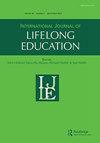On older learners’ naïveté: an examination of the emancipatory function of critical older adult education
IF 1.9
Q2 EDUCATION & EDUCATIONAL RESEARCH
引用次数: 0
Abstract
ABSTRACT Many critical educational philosophies assume that learners are naïve and unable to critically read their social reality. Critical educational gerontology (CEG) aims to emancipate learners from oppression, to which they are oblivious. This strand of older adult education charges teachers with the task of raising learners’ naïve consciousness, by leading them on the (Freirean) path of critical reflection and critical action. Literature employing CEG concludes that this path often ends with learners being reluctant to engage in critical action because of their ongoing (internalised) oppression. In this paper, we adopt a critical stance towards CEG’s logic of emancipation guided by Anthony Giddens’ structuration theory. As such, we question the inability of older learners to understand, and act on, their social reality independently from teachers. Starting from Giddens’ theory, we apply a reflexive thematic analysis to interview data tackling the socio-economic reality of 11 older learners at a university for the third age in Lebanon. The results support the conclusion that older learners at the U3A can decode their social reality and reflexively engage in social change, but their efforts or reluctance are influenced by constraints, not necessarily naïve consciousness. Consequently, we recommend a revisit of CEG’s logic of emancipation.论老年学习者naïveté:批判性老年成人教育的解放功能考察
许多批判性教育哲学假设学习者是naïve,无法批判性地阅读他们的社会现实。批判教育老年学(CEG)旨在将学习者从他们所忽视的压迫中解放出来。这种老年成人教育方式要求教师通过引导学生走上批判性反思和批判性行动的(Freirean)道路,来提高他们的naïve意识。采用CEG的文献得出结论,这条道路往往以学习者不愿参与批判性行动而告终,因为他们正在进行(内化)压迫。本文以安东尼·吉登斯的结构理论为指导,对CEG的解放逻辑持批判态度。因此,我们质疑老年学习者在脱离教师的情况下无法理解他们的社会现实,并据此采取行动。从吉登斯的理论出发,我们运用反身性主题分析对黎巴嫩一所大学三年级11名年长学习者的社会经济现实进行了访谈数据。结果支持了U3A的老年学习者能够解码他们的社会现实并反射性地参与社会变革的结论,但他们的努力或不情愿受到约束的影响,而不一定是naïve意识。因此,我们建议重新审视CEG的解放逻辑。
本文章由计算机程序翻译,如有差异,请以英文原文为准。
求助全文
约1分钟内获得全文
求助全文
来源期刊

International Journal of Lifelong Education
EDUCATION & EDUCATIONAL RESEARCH-
CiteScore
3.10
自引率
27.80%
发文量
40
期刊介绍:
The International Journal of Lifelong Education provides a forum for debate on the principles and practice of lifelong, adult, continuing, recurrent and initial education and learning, whether in formal, institutional or informal settings. Common themes include social purpose in lifelong education, and sociological, policy and political studies of lifelong education. The journal recognises that research into lifelong learning needs to focus on the relationships between schooling, later learning, active citizenship and personal fulfilment, as well as the relationship between schooling, employability and economic development.
 求助内容:
求助内容: 应助结果提醒方式:
应助结果提醒方式:


